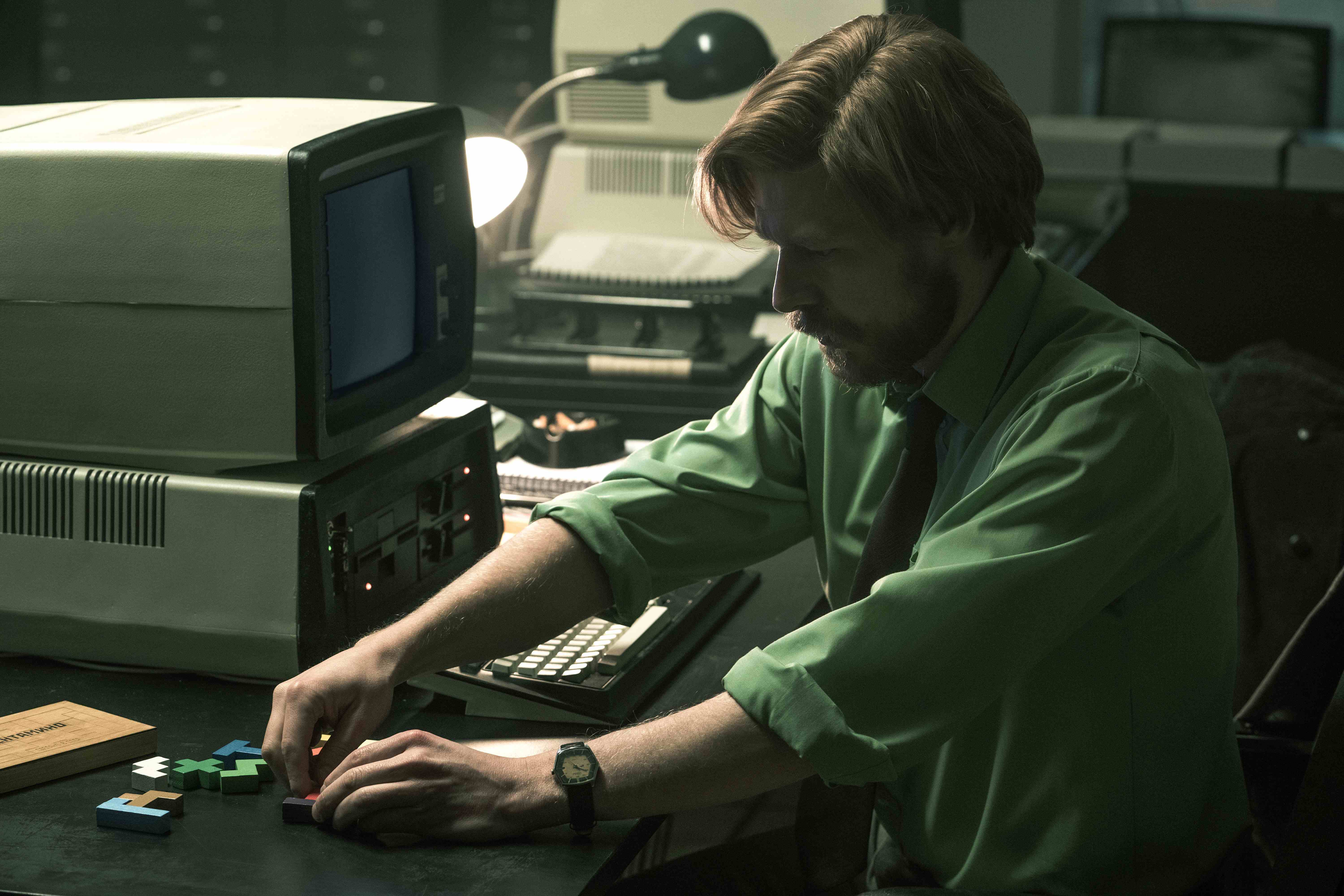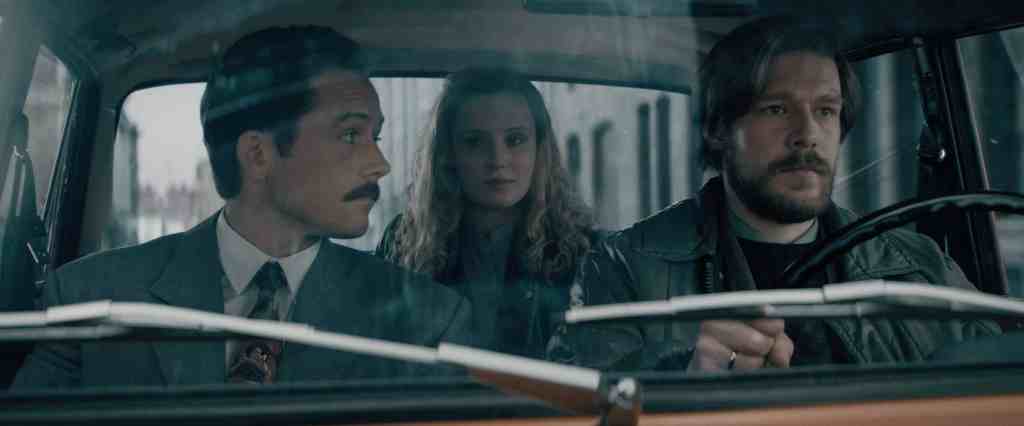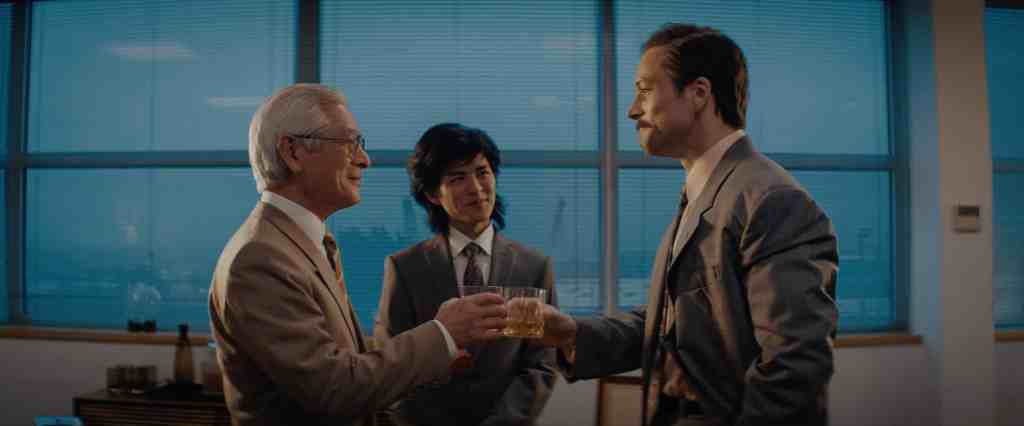The real-life story of how Tetris was brought West was already head-spinner.
The game’s path – from its humble origins as a pet project, to its status as a timeless pop culture icon – is fraught with complex business contracts and human miscommunication, the rise and fall of numerous companies, a clash of communist and capitalist ideals, and several parties all fighting to gain hold of the same thing.
It’s brain-twisting stuff, but the stakes certainly weren’t as extreme as it’s depicted in the Apple TV+ original film Tetris, directed by Jon S. Baird (Stan and Ollie) and starring Taron Egerton. At least, I hope it wasn’t.
But from what I understand of the game’s true-life history, Apple’s Tetris gets a lot of things right – the key players, the big hurdles, and the financial and emotional investments involved. It’s not a documentary by any means, but it succeeds in painting a tense narrative around the Tetris rights battle, and manages to depict the game’s profound importance in a compelling way.
Tetris wastes no time in getting into the meat of the story, with Henk Rogers (Egerton), a Japanese-based video game developer and salesman discovering the existence of Tetris at a tech trade show, and snapping up the rights to publish the game in the Japanese market.
When part of his licensing deal falls through, thanks to the extremely hateable British media mogul Robert Maxwell (Roger Allam) and his son Kevin (Anthony Boyle), his close relationship with Nintendo and its then-president Hiroshi Yamauchi (an uncanny Togo Igawa) leads him to learn of the imminent release of the Game Boy — the handheld video game console that would go on to sell close to 120 million units.
Foreseeing the incredible possibility of including Tetris as part of the console, Rogers goes on a globe-hopping quest to secure the global handheld rights for the game. The obstacles come in the form of three separate rights holders cottoning on to the unbridled potential of handheld Tetris, and the fact that the intellectual property rights for the game lie not with its creator, Alexey Pajitnov (Nikita Yefremov), but with the Soviet state-owned software company he works for.

From there, Tetris quickly spirals into high-stakes, spy thriller territory as the key players attempt to negotiate the hostile environment that is 1980s Soviet Union and its bureaucracy, protocol, and corruption.
The complexities of the actual, true-to-life business dealings manage to come across in an understandable, if highly theatrical manner, with each revelation making for compelling drama in its own right, and each player bringing distinct and very watchable personalities into the fight.
The audience knows that Tetris will go on to become the biggest and highest-selling video game of all time – but the big risks and the unknowns of the situation are keenly felt through the characters here. The financial and emotional stakes are progressively raised as the film continues, and from the second act onwards, the film is one big boiling pot, about to bubble over.
Tetris takes several steps to up the ante to entertainingly ludicrous levels, however, using some lavish artistic licence to weave in subplots involving corrupt Soviet government officials, manipulative KGB spies, Henk and Pajitnov’s family lives, and the fall of the Soviet Union. One of the most climactic scenes involves a high-speed car chase through the streets of Moscow involving Nintendo of America leadership, while Bonnie Tyler’s ‘Holding Out For A Hero‘ blares.

It’s ridiculously over the top, to be sure. But it also all feels in service of tangibly visualising the heightened emotional states of the players involved. What Tetris also does throughout is treat the intellectual property of the game itself as something with reverence and a real power. It’s something worth fighting for, something that’s representative of both remarkable individual creativity and reckless capitalist ambition. It’s never trivialised as ‘just a video game’, and rightly so.
Where Tetris does border on being trivialised, however, is the film’s curious decision to incorporate animated pixel-art sequences, as well as adorn key sequences with retro game-inspired visual effect flourishes.
Some of it works well as a storytelling device – the short, animated vignettes sometimes act as visual aids to help run through key players in the story, or help explain the difference between video games, computer games, and arcade games.
But stylistically, it feels very incoherent to a trained eye. There are a handful of completely different pixel art aesthetics in the film, some far more detailed than others, including a rotoscoping effect that turns things into objects constructed from voxels (3D pixels, essentially). Considered together as a whole, everything just clashes, and what’s more, none of the styles has any obvious visual ties to Tetris itself.

The best indication of this attitude – and I admit this is a pedantic example – is when Rogers is attempting to convince Nintendo President Yamuchi to agree to a partnership. When the idea of ‘partnership’ is dwelled upon, a clip from Super Mario Bros. (1985) is shown, and then a clip from The Legend of Zelda: Four Swords (2004). They’re both examples of pixel art, yes, but the two titles are decades and technological generations apart in style and palette, in look and feel. It’s unconsidered.
Add to that an overuse of cliche retro video game terminology, and the whole cacophonous treatment almost undermines the otherwise engaging corporate thriller underneath – and for no real reason other than to remind the audience that Tetris is a video game. Given a little more care, this visual treatment could have felt more impactful. As it stands, the result feels like an afterthought, empty lip service for video game enthusiasts.
Flippant adornments aside, solid performances are given by Taron Egerton, who puts in a very watchable performance as Henk Rogers, the overly chatty businessman, and Nikita Yefremov as the humble and softly-spoken Pajitnov – with both depictions feeling true to life. The supporting cast is sharp and memorable, especially Oleg Stefan as Pajitnov’s boss Nikolai Belikov, and Toby Jones as Robert Stein.
The story of Tetris is one worth telling, and this interpretation is one worth hearing. With all its bombastic embellishments, some more successful than others, the film succeeds at keeping you in your seat with eyes wide open, and gets you heavily invested in the legacy of an absolutely iconic piece of work.
TETRIS
Director: Jon S. Baird
Writer: Noah Pink
Producers: Matthew Vaughn, Gillian Berrie, Gregor Cameron, Len Blavatnik, Claudia Vaughn
Distributed by: Apple TV+
This article was originally published on GamesHub.
A pre-release screener of Tetris was provided for the purposes of this review. GamesHub has affiliate partnerships. These do not influence editorial content. GamesHub may earn a small percentage of commission for products purchased via affiliate links.
Actors:
Director:
Format: Movie
Country:
Release:





